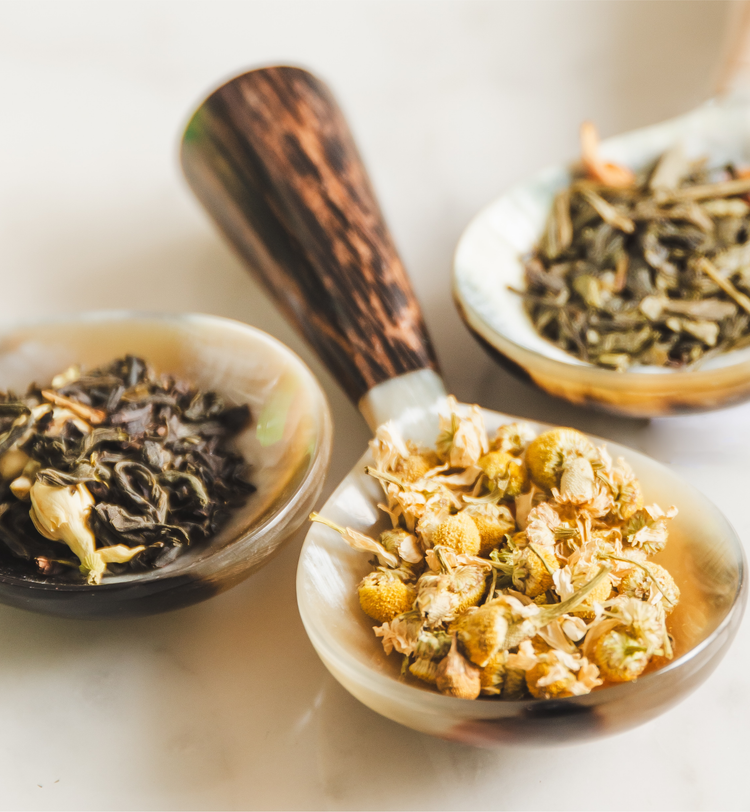What is the difference between herbal tea and tea?
Tea and herbal tea share the ritual of infusion but differ profoundly. Tea, derived from Camellia sinensis, contains caffeine and is stimulating, while herbal tea combines plants and fruits without caffeine and is soothing. Betjeman & Barton celebrates these two worlds to accompany every moment and every need.
While herbal tea and tea share a common ritual—that of infusion—they are nevertheless very different, both in their effects and their composition. While one is the result of a blend of plants and soothes, the other comes from the tea plant and stimulates.
Maison Betjeman & Barton sheds light on the fundamental differences between herbal tea and tea, allowing you to adapt your hot drinks to your desires and needs of the moment.
Origin and composition: it all starts at the source
On one hand, tea is made from the leaves of the tea plant, also known as “Camellia sinensis”. Whether it is black, white, green or oolong, it contains theine, a molecule similar to caffeine, which gives it natural stimulating properties.
On the other hand, herbal tea doesn't contain tea leaves. It takes the form of a blend of plants, flowers, fruits, or spices. Chamomile, mint, verbena, licorice: each blend promotes well-being. Because it's naturally caffeine-free, herbal tea is particularly prized for its gentle and soothing effects.
It's worth remembering that rooibos, which is often confused with tea, does not come from Camellia sinensis. It comes from a South African shrub and does not contain caffeine, which is why it is considered an herbal tea in the world of infusions.
Preparing your own infusion, a delicate art
Each type of leaf or plant has its own preferences when it comes to infusion.
Tea preparation requires skill and precision. Water that is too hot can burn the leaves, while an incorrect steeping time can alter the taste of the beverage. For example, black tea is generally considered to be steeped at 85-95°C for 3 to 5 minutes, and green tea at 70-80°C for 2 to 3 minutes.
More flexible than ever, herbal tea preparation can be done using three main methods: classic infusion, decoction, and maceration. Brands and manufacturers also indicate an infusion time and duration for each herbal tea, to help you prepare beneficial and flavorful cups.
The benefits of herbal tea and tea
Thanks to its natural theine content, tea acts as a mild stimulant on the body. On a daily basis, it helps, for example, to improve concentration and support alertness.
Tea is also rich in antioxidants, which are beneficial for combating oxidative stress and premature aging. In short, it's a valuable ally for starting the day right or staying productive throughout the afternoon.
Herbal tea, on the other hand, stands out for the diversity of its properties. Some ingredients have a calming effect, such as linden and chamomile, while others aid digestion, like mint and fennel, or improve sleep, such as lavender and verbena. Being caffeine-free, herbal tea is suitable for all consumers and for many times of the day.
At what time of day is it best to enjoy a cup of herbal tea or tea?
Tea is best enjoyed upon waking or after lunch. It provides all the energy needed to face the day, while offering a refined tasting experience with every cup.
Herbal tea is best enjoyed in the evening or during periods of stress. Its consumption fits perfectly into a relaxing routine and gently harmonizes body and mind without disrupting sleep.
Most herbal teas and teas can also be enjoyed hot or cold, depending on the weather and your mood.
Here is a clear and simple comparison chart to understand all the differences between herbal tea and tea :
|
Tea |
Herbal tea |
|
|
Composition |
Tea leaves |
Plants, flowers, fruits, spices |
|
Theine content |
With theine |
Caffeine-free |
|
Effects |
Stimulant, antioxidant |
Soothing, digestive, relaxing |
|
Tasting moments |
Morning and afternoon |
Evening, moments of relaxation |
|
Preparation method |
Infusion |
Infusion, decoction, maceration |
Betjeman & Barton teas and herbal infusions: between tradition and innovation
Within our French Maison with British inspiration, we celebrate both the elegance of fine teas and the sensory richness of herbal teas to satisfy all preferences and desires.
We select in particular the finest leaves, sourced from the most beautiful gardens across China, India or Japan, as well as the purest plants to compose teas and infusions with subtle aromas.
Explore our exclusive collection of herbal teas and teas to find your ideal infusion and make every cup a unique taste journey.

